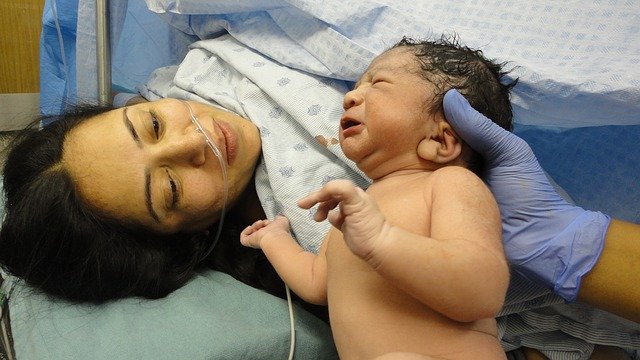The moment your baby is born is a profound and life-changing event. As a new parent, you may feel a mix of excitement, joy, and anxiety about what lies ahead. Understanding what to expect in the hours, days, and weeks following the birth of your baby can help you navigate this new chapter with confidence and ease. This article provides a detailed overview of the immediate postpartum period, covering everything from your baby’s first moments to essential postpartum care for both mother and child.
Immediate Post-Birth Moments
Skin-to-Skin Contact and Bonding: Immediately after birth, your healthcare provider will place your baby on your chest for skin-to-skin contact. This practice, known as kangaroo care, helps regulate your baby’s body temperature, heart rate, and breathing. It also promotes bonding and breastfeeding. During this time, your baby may be gently dried and covered with a warm blanket to maintain body heat.
Apgar Score Assessment: Within the first few minutes of life, your baby will undergo the Apgar score assessment. This quick evaluation measures your baby’s heart rate, breathing, muscle tone, reflexes, and skin color to ensure they are adjusting well to life outside the womb. The test is performed at one and five minutes after birth and helps healthcare providers determine if any immediate medical intervention is needed.
First Hours After Birth
Initial Health Checks: After the Apgar assessment, your baby will undergo a series of health checks. These may include measuring weight, length, and head circumference, as well as a thorough physical examination to check for any abnormalities. Your baby’s vital signs, such as heart rate and temperature, will be monitored regularly.
Vitamin K and Eye Ointment: In many countries, it is standard practice to administer a vitamin K injection and apply antibiotic eye ointment shortly after birth. Vitamin K helps prevent bleeding disorders, while the eye ointment protects against potential bacterial infections acquired during delivery.
First Feeding: Breastfeeding is encouraged within the first hour after birth. This early feeding helps stimulate milk production and provides your baby with colostrum, a nutrient-rich, antibody-packed first milk that boosts the immune system. If you choose to formula-feed, the initial feeding will also take place during this time.
First Days After Birth
Newborn Screening Tests: Before leaving the hospital, your baby will undergo several screening tests to check for metabolic, genetic, and developmental conditions. These tests often include a heel-prick blood test, a hearing test, and a jaundice assessment. Early detection of these conditions allows for prompt treatment and management.
Umbilical Cord Care: The umbilical cord stump will remain attached for several days after birth. It is important to keep the area clean and dry to prevent infection. The stump will naturally fall off within one to two weeks, leaving a small wound that will heal over time.
Circumcision (If Applicable): If you choose to have your baby boy circumcised, the procedure is usually performed within the first few days after birth. Post-procedure care involves keeping the area clean and applying ointment to promote healing.
Sleep and Feeding Patterns
Newborns typically sleep for 16 to 18 hours a day, waking frequently to feed. It is normal for feedings to occur every two to three hours, including during the night. Establishing a feeding routine and recognizing hunger cues will help ensure your baby is getting enough nourishment.
Postpartum Care for the Mother
Physical Recovery: Your body will undergo significant changes as it recovers from childbirth. You may experience vaginal bleeding, known as lochia, for several weeks. This bleeding gradually decreases in intensity and changes color from bright red to pink, then to brownish-yellow before stopping. It is important to rest and avoid strenuous activities to support healing.
Perineal Care: If you had a vaginal delivery, you might have perineal soreness or stitches from an episiotomy or tear. Keeping the area clean, using cold packs, and taking sitz baths can help alleviate discomfort and promote healing.
Postpartum Checkups: Your healthcare provider will schedule a postpartum checkup within six weeks after delivery to assess your recovery and address any concerns. It is important to attend this appointment and discuss any physical or emotional changes you are experiencing.
Emotional Well-being: The postpartum period can bring a range of emotions, from joy and love to anxiety and sadness. It is common to experience “baby blues,” characterized by mood swings, irritability, and mild depression. However, if these feelings persist or intensify, it may be a sign of postpartum depression, and it is important to seek help from a healthcare professional.
Establishing a Routine
Developing a Daily Routine: Establishing a daily routine can provide a sense of stability and predictability for both you and your baby. This includes setting regular times for feeding, sleeping, and play. Flexibility is key, as newborns’ needs can change rapidly.
Bonding and Interaction: Bonding with your baby through activities like holding, talking, singing, and playing is crucial for their emotional and cognitive development. Responding to your baby’s cues and providing a nurturing environment fosters a secure attachment.
Seeking Support: Parenting a newborn can be overwhelming, and it is important to seek support from family, friends, and healthcare professionals. Joining a parenting group or attending baby care classes can also provide valuable information and a sense of community.
Conclusion
The arrival of your baby marks the beginning of an incredible journey filled with new experiences and challenges. Understanding what to expect in the immediate postpartum period can help you navigate this time with confidence. From the first moments of skin-to-skin contact to establishing a daily routine, each step is a part of the beautiful process of welcoming your new baby into the world. Remember to take care of yourself, seek support when needed, and cherish the precious moments with your newborn.

